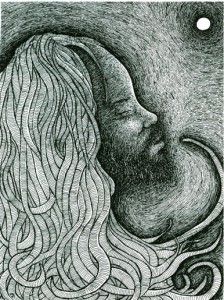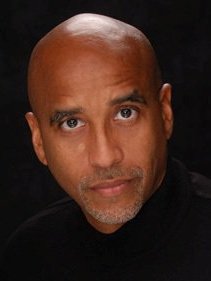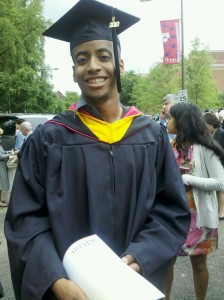Long Distance Revolutionary: An Intergenerational Conversation
By Alexis Pauline Gumbs, Clyde Gumbs and Jared Gumbs
 This summer I attended a screening of Prison Radio’s film about Mumia Abu-Jamal, Long Distance Revolutionary. Mumia Abu-Jamal has been in prison for my entire lifetime, and I have learned on many occasions about his unjust incarceration, his participation in the Black Panther Party and his continued radio activism. You can usually see a “Free Mumia” pin or t-shirt somewhere at every large event I attend. However, Long Distance Revolutionary gave me more than any protest talking points had ever offered. The film, using Mumia’s poetic words, the perspectives of women and men who worked alongside him in the Black Panther Party, writers and scholars who have studied his work and a range of artists as a gateway to all of us who continue to be inspired by his presence in our cultural, political and intellectual world despite everything.
This summer I attended a screening of Prison Radio’s film about Mumia Abu-Jamal, Long Distance Revolutionary. Mumia Abu-Jamal has been in prison for my entire lifetime, and I have learned on many occasions about his unjust incarceration, his participation in the Black Panther Party and his continued radio activism. You can usually see a “Free Mumia” pin or t-shirt somewhere at every large event I attend. However, Long Distance Revolutionary gave me more than any protest talking points had ever offered. The film, using Mumia’s poetic words, the perspectives of women and men who worked alongside him in the Black Panther Party, writers and scholars who have studied his work and a range of artists as a gateway to all of us who continue to be inspired by his presence in our cultural, political and intellectual world despite everything.
For me the film was about love. How is a Black man’s love for his community criminalized? How does a young person learn to love himself and his community enough to create a body of work that not even prison walls can halt? How does a community tangibly love a person that is trapped in solitary confinement? And expanding from the image of Mumia as a young man, we see him as a father, an activist, a journalist, and now an elder in our movement. I also thought about the men in my life and my love for them across the distance of differing experiences and a system that often keeps us away from each other. I especially thought about the particular violence that Black men face as targets of the police and other so-called safety workers and the healing that is needed for our whole community.
The DVD version of Long Distance Revolutionary, which also includes a short film focusing on the details of the criminal case used to entrap Mumia, was released on my father’s birthday. As soon I learned about the release date, I knew that I would buy a copy of the film for my father. After I sent it to my father and he watched it, he shared it with my 23 year-old younger brother. Both my father and my brother moved to Philadelphia to attend the University of Pennsylvania. Mumia was born and raised in Philadelphia and he remains imprisoned in Pennsylvania. I wanted to know how the film impacted them and what they had to say about the enduring issues of police brutality and racism as Black men of different generations who have lived in Philadelphia. For me this is a Black feminist beginning to a conversation that I hope continues across generations and genders.
My father Clyde Gumbs is a poet, lawyer and business consultant who was educated at the University of Pennsylvania. My brother Jared Gumbs is a recent graduate of University of Pennsylvania’s Wharton School of Management who works in development and fundraising at Villanova University and continues to live in Philadelphia.
Lex: Thank you both again so much for being part of this conversation. What did you think about Long Distance Revolutionary? What were moments that stayed with you?
Clyde: I was especially interested in the short film about the case…since I am offended by his incarceration.
Lex: What about you Jared? Were you familiar with Mumia’s story before watching the film?
Jared: I was not at all familiar with the story. It was completely new to me.
Clyde: I liked the way they did the short video about the legal details of the incident. I learned more details about the case, which only further substantiated what I already believed.
Lex: What were your thoughts after learning (more) about Mumia’s life and current situation from the film?
Clyde: I had never believed that it made any sense for him to have done what he was accused of, and I had always seen it as a corrupt system wanting to make an example of Mumia because they wanted to intimidate people who were willing to speak out.
I guess I was not at all surprised that what happened to him could have happened, but I was surprised that it seems there has still been so little resolution in the face of so much evidence of his innocence. Naturally him being the journalist that he was did not appeal to the power structure, so they wanted to take him down. I don’t really see his situation as that different from Assata’s in that it’s just more of the system silencing people who speak out.
Lex: Were there any parts of the film that you especially identified with? Did you see yourself in the film in any way?
Clyde: That’s what I grew up seeing, that’s what I grew up believing, and that’s what was consistent with my experience of being mistreated by the police. I grew up expecting to be harassed by the police. I grew up hating the police, referring to them as the pigs. I grew up feeling no remorse whatsoever when I heard a police officer was shot and/or killed. Fortunately for me, I made sure to avoid exacerbating any confrontation, and I was never at the scene of a violent crime.
Jared: I didn’t see myself in it really. I saw a completely different experience than I have come to expect in my life.
Lex: I think that relates to the next question. How does the depiction of Philadelphia in the film resonate with each of your experiences of living in Philadelphia?
Jared: That was not my Philadelphia. My experience in Philadelphia has been only with the University police at Penn and has been better than my experience with police officers in any other place I’ve been. My experience in Philadelphia however did reflect some of the fear of Black people present in the film, but it wasn’t from the police officers.
Lex: Jared can you say more about how that fear played out…and what felt different about it from your earlier experiences growing up in the South?
Jared: Students had a very irrational fear of both west and north Philadelphia. To many students going west on Baltimore Street was the same as begging to get shot, robbed or stabbed. In the South, at least in Chattanooga, people had the same irrational fears, but they were even less warranted. In Philly being Black made me feel safer, not less safe like in the film.
Clyde: My experience with city cops in New York City and Philly was similar. I am not talking about the University police. I went to High School in New York City and college, grad school and law school in Philly. I was stopped by police in both places on a number of occasions and I was taken to the police station for questioning in New York City.
In 1971 in New Jersey once when I was in High School, we had gone on a day trip as Black students with a Black adult chaperone and on the way back from the boardwalk in Atlantic City we were stopped by New Jersey State Troopers and they came to the car, our school’s station wagon, with their guns drawn and pointed at us. This type of experience was not uncommon at that time.
Lex: Wow. I am taking a deep breath to hold and release the energy of the experiences you are both describing. And honoring what it has meant for you both to witness/experience police harassment and to hear everyday racist narratives about Black people and to still remain such loving people with positive spirits. Jared what do you think explains the difference in your experience? Daddy, do you think things have shifted over time? Or is it just the same stories manifesting in different ways?
Clyde: When I was growing up I had much more fear of the police than I had of criminals. I think that which informs the hostility of a Criminal Justice system designed to intimidate young Black men from my generation is directly responsible for what happened to Mumia. That’s the way I see it. They wanted young Black men to be suppressed instead of being a viable force in the society, because they wanted to dominate the Black community. He was at odds with that and he was publicizing that critique. It’s not accidental. He was a target. If the city police would harass me as a kid at Penn on the way to go play basketball and then on the way home they would stop me again… If they would do that to me then imagine what they would do to an activist like him.
I didn’t feel all that unsafe among Black people in Black neighborhoods growing up…but I’m sure white people would have. On the other hand, white people didn’t feel unsafe around White police Officers…but I certainly did. The intimidation that we experienced caused us to really have a strong level of resentment for the police so much so that it was hard to even see them as human.
Jared: I think it really has to do with the University police at Penn, and how I never at any point thought they had anything other than my safety as a priority. That coupled with the fact that like Daddy I have never felt unsafe in a BLACK neighborhood and definitely not in the area surrounding Penn as an above average sized Black man. All of this said, I have not had to interact with city police officers in other parts of Philadelphia.
Clyde: What informed the treatment that I experienced still exists today. The way it is messaged, contextualized and justified may be somewhat different. Additionally, the society felt somewhat more threatened back then by the rise of a Black consciousness. At that time there was more willingness on the part of Black people to rise up and to reject white supremacy. Following that period, because of an appeasement strategy the people that would have become activists, especially educated people have been siphoned off, co-opted and bought off with better jobs, political access, and money and now activists who truly have a different vision of how society can be are seen as marginal, racism is thought of as being a thing of the past and that radical Black consciousness is limited to a smaller segment of the Black community.
What I saw in the film was entirely consistent with my experience of Philadelphia and the country at that time. It does not surprise me that they did, and continue to do, what they are doing to Mumia. The politics of today don’t allow them to correct the injustice.
Jared: The film gave me new examples of things I was aware of. Of course people are afraid of smart, articulate people in groups they are trying to oppress.
Lex: One thing that I really loved about the film was the range of people who were interviewed. I enjoyed hearing from people of different genders, ages and races.
Jared: I too was impressed by the range of people interviewed.
Clyde: The only thing about Mumia’s situation that I find remarkable is what he has been able to accomplish from prison, especially when he was on death row. If there is one thing that is clear, Mumia is a remarkable man, in many ways. Just his radio voice alone would have been a reason for him to be admired.
Jared: I would agree with that.
Lex: There is a moment in the film where Cornel West compares Mumia to Oprah and finds Oprah relatively superficial. He also compares Mumia to other former Black Panthers and says that for some of them “the love wasn’t strong enough.” What are your definitions of sincere engagement and strong love when it comes to your community, family and self?
Clyde: I don’t understand why and how it makes sense to compare Oprah to Mumia. Oprah is a capitalist entertainer and Mumia is a “martyred” activist…why associate the two?
Lex: I think that might be part of the point. According to the film, Mumia could have chosen to do more mainstream journalism but he didn’t. I think Cornel West feels that Mumia could have been at the level of an Oprah because of his talents as a journalist if he had compromised his beliefs.
Jared: I personally have lived a life more or less avoiding conflict as much as possible without compromising who I am, but he seemed more like the type of person to embrace conflict to validate who he is.
Lex: What about the question of “strong love.” I was moved by watching the film about how much it would take to maintain love for a community that you literally never got to see or touch for decades. What is there for society to learn from Mumia’s love?
Jared: Would it be that hard to maintain that love? I feel like it was that love that sustained him. He needed it in his life to continue carrying on.
Lex: That’s a good point. I think it is definitely the love that has kept him going.
Clyde: The thing that had Mumia end up in prison, as far as his approach to life, is the same thing that has allowed him to generate his activism in the face of his circumstances. It is his self-expression and he was just being himself, which had them target him, and he has just continued to be himself.
Lex: I think that is really powerful. Because many people feel that they don’t know how to really be themselves even in less violent circumstances.
Clyde: I am not saying it isn’t love…but what distinguishes him from so many others is the integrity of his commitment to be himself and do his thing.
Lex: What will you carry forward from the film?
Jared: For me it validates that if you are the best version of yourself you will always be able to find people to stand beside you.
Clyde: It did do two things: I was brought present to my outrage with oppression and I was inspired by what a human being can accomplish in remarkably adverse conditions.
Lex: When I watched the film and then learned that it was coming out on DVD on June 11th, I immediately thought it would be a great film for Daddy to be able to watch, and Daddy when you saw it you felt moved to share it with Jared. Are there any other people that you especially hope will watch this film?
Clyde: I would like for Seneca (Jared and Alexis’s younger brother) to watch it and Black people in general. To me it is not surprising that a white power system would treat Mumia like this, but the Black community really has not supported and stood up for Mumia in a way that matches who he is, the injustice he experienced and what his commitment is to the Black community. It is unacceptable. Why is it that that has to be the case? I believe that if Black people would address that, that pattern in our community of accepting things that are absolutely unacceptable then that would be a new day.
Jared: Anyone that would watch it and find something that would surprise them.
Clyde: I don’t know how effective it is for white people who are in denial, but it could be enlightening for white people seeking to “get” how Black people may experience things.
I think it would be good to have Black fathers and sons watch it together…and then have discussion groups afterwards…it could be an all day thing.
Lex: That’s a great idea. Are there any other thoughts you want to share?
Jared: The Black experience is so different now.
Clyde: How much different is it for young brothers dealing with stop-and-frisk in New York City, or for the parents of Trayvon Martin?
Jared: I didn’t say it was so much better, but very different.
Clyde: Or the innocent brothers in prison. Stop-and-frisk sounds a lot like what I experienced and if you had grown up in Brooklyn…it might be your experience as well, Jared.
Lex: There is definitely a lot of healing to do and a lot of work still to be done to honor the lives of Black people and all people.
Jared: Just because you can catch a foul ball at a game at Yankee Stadium and Fenway Park doesn’t mean the experience of going to a game there is the same.
Clyde: Every day we hear about somebody Black being exonerated after long prison sentences and prosecutorial misconduct.
Jared: Were people being exonerated 40 years ago?
Clyde: Almost never, Jared.
Jared: And that is a difference.
Clyde: Because now we have DNA evidence, but we have many, many, many more brothers in prison today than we did when I was growing up. The Black prison population has grown much faster than the Black population. I don’t believe all those brothers are guilty. There certainly has been change…but not as much as I had hoped. I am happy to hear that it’s been better for you, Jared, than it was for me. I am very happy about that…and I am still not happy about the way things are.
Jared: You don’t have to be happy about where you are to be happy about the progress.
Lex: And there may be more nuances to how racist narratives reproduce themselves across time. I hope that we can have more conversations about what has changed and what has stayed the same…and how we can support each other across generations.
Gumbs







0 comments